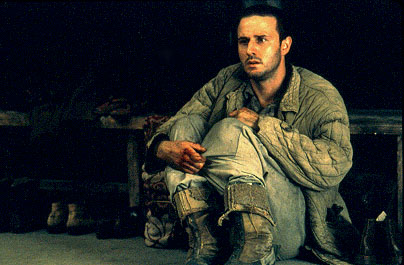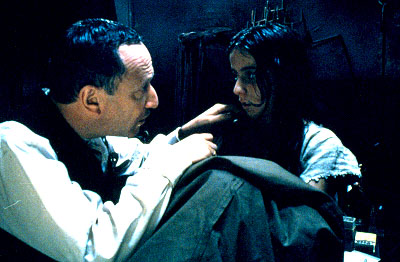

Searing imagery contrasts with miscast performances in The Grey Zone, Tim Blake Nelson's adaptation of his own play, which was based on the book Auschwitz: A Doctor's Eyewitness Account by Miklos Nyiszli. The events in the film deal primarily with the Sonderkomando, a group of Jews forced to work for the Nazis against their fellow Jews in exchange for possibly a couple more months of life. Nyiszli was a Jewish doctor 'working' for the Nazis. He tended to the wounded Jews in the concentration camps. It is a strange paradox that many of the characters refuse to talk about, because it does have many morally ambiguous ramifications. The most they say is that they are not the ones killing, although they can be considered the ones who lead their brethren to death's door.
As a writer/director Nelson (O, Kansas) is vastly different from his acting roles (Minority Report, The Good Girl). As an actor, he tends to gravitate toward mentally challenged men, low-lifes, and other sorts of drudgery. Behind the camera, he tends to go for much more serious work, grander in scope and meaning. The Grey Zone tells of what happens to the Sonderkomandos when they find a young girl (Kamelia Grigorova) who survived the gas chamber. It is a miracle that she did so, and they want nothing more than for her to live. However, harboring her is extremely dangerous, and the Sonderkomando are planning a revolt. Muhsfeldt (Harvey Keitel, Red Dragon, Little Nicky) suspects something is happening, and is trying to get Nyiszli (Allan Corduner, Food of Love, Moonlight Mile) to find out what it is. Nyiszli knows, and lies to Muhsfeldt.
There is a lot of drama inherent in The Grey Zone primarily because of its subject matter. Nelson is frank in depicting scenes of Sonderkomando burning bodies, or gas chambers just after the doors reopen. The images are somber and bleak, and above all else, powerful reminders of the evils that happened. But when the actors start speaking, the intense effect of the Nelson's images looses much of its power. Of all the people cast, one would expect David Arquette (Eight Legged Freaks, See Spot Run) to fare the worst, but he actually comes across really well. Unlike his other bumbling roles, here he is sullen and serious, and comes across as convincing. Steve Buscemi (Spy Kids 2, Mr. Deeds), Mira Sorvino (The Triumph of Love, Bamboozled), and Natasha Lyonne (Kate & Leopold, American Pie 2), all extremely talented actors, do not. They seem a little too contemporary (although Sorvino did a good job of looking very unglamorous) to be in the movie. The level of acting present here, as evidenced by the actors is impressive, yet is too distracting from the story itself.
The real conflict is more internal, and stems from the aforementioned paradox. Arquette, Corduner, and some of the other actors have superficially doubletalked themselves out of any real guilt, but when they sit down to think about it, their actions haunt them. And when they do talk about it, it frequently leaves them confused and frustrated. It is this huge divide that is at the heart of The Grey Zone; issues about what is right and wrong, and how these things may change in a time and place like Auschwitz. Nelson never really answers the question, but then again, there may not be a right answer.